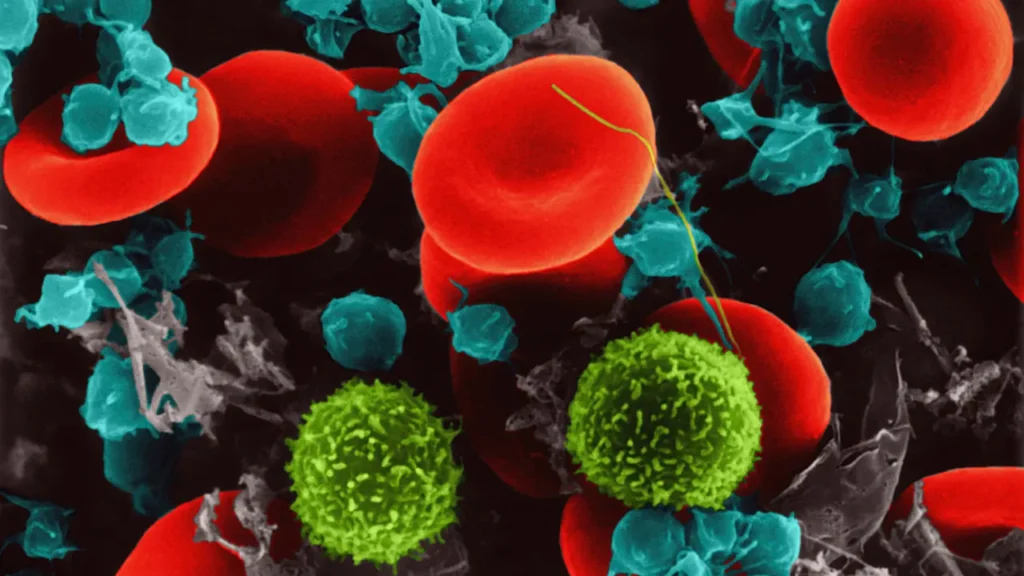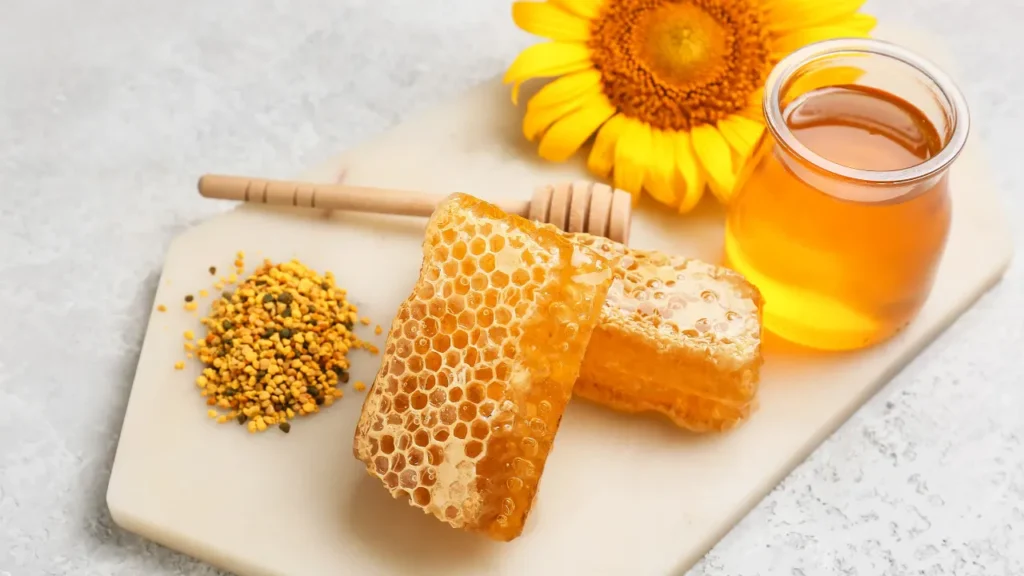Bee pollen, a naturally occurring material that honeybees gather from flowers, has become more well-liked as a dietary supplement in recent years. Understanding the chemistry of bee pollen, its physiological functions, and responsible use are crucial as the study explores its potential advantages and applications. Bee pollen’s nature, health advantages, recommended dosage, potential side effects, and drug interactions are all covered in-depth in this article.
You May Also Like:
Onnit Alpha Brain vs Evolvere’s QUANTUMiND Classic
Chaga: Benefits, Dosage, Side Effects, Drug Interactions, and Other Important Information
Bee Pollen: Benefits, Dosage, Side Effects, Drug Interactions, and Other Important Information is an original (NootropicsPlanet) article.
Nature of Bee Pollen
A granular material known as bee pollen is composed of pollen grains that honeybees (Apis mellifera) have collected from a variety of plant types. The pollen is combined with honey or nectar, which serves as a binding agent, and stored in the hive by the bees as their main food supply. Bee pollen contains a variety of nutrients, including proteins, amino acids, lipids, carbohydrates, vitamins, minerals, and bioactive substances like flavonoids, phenolic acids, and phytosterols. The content of bee pollen varies depending on the plant species from which it is obtained.
Health Benefits of Bee Pollen
Numerous possible health advantages of bee pollen have been discovered via research, some of which include:
- Increased energy and vitality: Bee pollen’s rich nutrient content and bioactive substances may help increase one’s overall vitality and energy levels. Its minerals, vitamins, and amino acids help the healthy operation of many biological systems and the creation of cellular energy.
- Improved immunological function: Bee pollen, as previously established, has immunomodulatory actions that may help boost immunity and safeguard against infections and other disorders.
- Antioxidant and anti-aging effects: Bee pollen’s antioxidant capabilities may aid in preventing oxidative cell damage and support anti-aging effects. This defense may lower the risk of chronic illnesses and enhance general health.
- Cardiovascular health: It has been demonstrated that the bioactive components of bee pollen, such as flavonoids and phytosterols, promote cardiovascular health by lowering inflammation, increasing blood lipid profiles, and improving blood vessel function.
- Liver health: According to research, bee pollen may have hepatoprotective properties that promote liver function and guard against liver damage brought on by a variety of pollutants.
- Allergic symptom relief: According to certain research, bee pollen may lessen allergy symptoms by regulating immunological reactions and lowering inflammation.

Chemistry of Bee Pollen
Bee pollen has a wide range of health-promoting effects because of its unique blend of chemical constituents. The following are some of the main chemical components of bee pollen:
- Amino acids and proteins: Bee pollen has all nine necessary amino acids as it contains around 20–30% protein. Numerous physiological activities, such as the synthesis of proteins, the creation of neurotransmitters, and the metabolism of cellular energy depend on amino acids.
- Lipids: Bee pollen contains a range of lipids, including phospholipids, glycolipids, and important fatty acids (omega-3 and omega-6). These lipids are essential for protecting the integrity of cell membranes, controlling inflammation, and promoting brain function.
- Carbohydrates: Simple sugars (such as glucose and fructose) and polysaccharides make up the majority of the carbohydrates in bee pollen. The general shape and functionality of bee pollen granules are influenced by carbohydrates, which are a vital source of energy for cells.
- Vitamins and minerals: Bee pollen contains a range of vitamins and minerals, including vitamin C, vitamin E, calcium, magnesium, potassium, and iron. It also contains B-complex vitamins. These micronutrients are crucial for supporting many physiological processes and preserving good health.
- Bioactive substances: Flavonoids, phenolic acids, and phytosterols are just a few of the bioactive substances that are abundant in bee pollen. These substances have anti-inflammatory, immunomodulatory, and antioxidant activities, which add to the health advantages of bee pollen.
Physiological Mechanism of Action of Bee Pollen
Bee pollen’s varied chemical make-up enables it to have a variety of physiological impacts on the body and brain. The following are the main mechanisms of action:
- Antioxidant activity: Bee pollen contains bioactive substances including flavonoids and phenolic acids that work as potent antioxidants to combat free radicals and lessen oxidative stress. This antioxidant activity may postpone aging, guard against chronic diseases, and shield cells from harm.
Anti-inflammatory benefits: Bee pollen’s bioactive components also have anti-inflammatory effects by controlling the release of cytokines and other mediators that promote inflammation. This effect may support healthy immune function and assist in lessening inflammation-related illnesses like arthritis.
- Immunomodulation: Bee pollen has been demonstrated to improve immunological responses by activating a variety of immune cells, such as macrophages, natural killer cells, and T-cells. This immunomodulatory impact may help bee pollen achieve its potential for enhancing general health and warding against diseases.

Optimal Dosage of Bee Pollen
Due to variances in the content of bee pollen and a lack of standardized recommendations, determining the ideal dosage can be difficult. Thus, you should start with a modest dose and then gradually increase it to gauge your tolerance and effectiveness. A typical starting dose for adults is 1/4 to 1/2 teaspoons per day, which can be raised to 1-2 teaspoons per day for maintenance. Before beginning any new supplement, including bee pollen, it is imperative to seek personalized medical advice to ensure correct guidance and safety.
Side Effects and Contraindications
Although most people consider bee pollen to be safe, some potential negative effects could arise, especially in those who have allergies to pollen or bees. Itching, swelling, hives, and, in extreme circumstances, anaphylactic shock are some of these side effects. Before taking bee pollen, anyone with allergies or asthma should use caution and speak with a healthcare provider.
Bee pollen’s safety during pregnancy and lactation hasn’t been thoroughly proven, so pregnant or nursing women should also talk to their doctor before using it.

Potential Substance Interactions of Bee Pollen
Bee pollen and other drugs or supplements may interfere, just like any other dietary supplement. Among the possible interactions are:
- Anticoagulants and antiplatelet drugs: When taken with anticoagulants or antiplatelet drugs like warfarin, aspirin, or clopidogrel, bee pollen may increase the risk of bleeding.
- Immunosuppressants: Bee pollen’s ability to activate the immune system may work to counteract the negative effects of immunosuppressive medications.
- Monoamine oxidase inhibitors (MAOIs): A family of antidepressant drugs called MAOIs may interact with several bioactive substances in bee pollen. MAOI users should talk to their doctor about the potential hazards and advantages of ingesting bee pollen.
Best Responsible Use of Bee Pollen
Follow these recommendations to ensure the best ethical usage of bee pollen as a dietary supplement:
- Start with a low dose, like 1/4 to 1/2 teaspoon daily, and gradually increase to 1-2 tablespoons as a maintenance dose daily.
- Buy bee pollen from reliable vendors to make sure it is clean, current, and devoid of impurities. Look for products with plain labels that list the product’s source, its processing details, and its storage recommendations.
- Store bee pollen correctly to preserve its effectiveness and freshness. Bee pollen should be kept out of direct sunlight in a cool, dry location. To avoid spoiling, always store bee pollen goods according to the instructions on the package.
- Speak with a healthcare expert before beginning any new supplement, including one containing bee pollen, to ensure adequate supervision and safety. For those who have allergies, use specific medications, are pregnant, or are nursing, this is especially crucial.
- Be aware of any side effects and stop using the product if any negative reactions happen. If you experience severe allergic responses like anaphylactic shock, get medical help right away.
While bee pollen is a rich source of nutrients and bioactive compounds, it should be used as a supplement to a balanced, nutrient-dense diet, rather than as a substitute for whole foods. By following these guidelines, individuals can safely and responsibly incorporate bee pollen into their daily routine and enjoy its potential health benefits.
Bee Pollen:
Conclusion
Bee makes up the intricate tapestry of our ecosystem, not only for the production of honey but most importantly, the pollination of countless plants. The pollen grains from honeybees (Apis mellifera) can come from a variety of plant types and are stored in the hive. These pollen grains have been found in studies to have tons of health benefits which include increased energy and vitality, improved immunological function, cardiovascular health, liver health, anti-aging effects, etc.
Pollen grain has a broad range of benefits because it includes all nine necessary amino acids, vitamins, minerals, lipids, and some other bioactive substances. If you are allergic to bee products, you should use them with high caution and take advice from your doctor. The optimal dosage of bees’ pollen does not have a standard recommendation. Hence, as a user, you must start with a modest amount and gradually increase until it directly impacts food production and the health of ecosystems.

References:
- Bee pollen: Chemical composition and therapeutic application. Retrieved from: https://www.ncbi.nlm.nih.gov/pmc/articles/PMC4377380/
- The Honeybee Apis Mellifera: An Insect at The Interface Between Human and Ecosystem Health. Retrieved From: https://pubmed.ncbi.nlm.nih.gov/35205099/
- Bioactive Compounds in Apis Mellifera Monofloral Honeys. Retrieved From: https://pubmed.ncbi.nlm.nih.gov/33864260/
- Medicinal And Cosmetic Uses of Bee’s Honey – A Review. Retrieved From: https://pubmed.ncbi.nlm.nih.gov/23559786/
Important Note: The information contained in this article is for general informational purposes only, and should not be construed as health or medical advice, nor is it intended to diagnose, prevent, treat, or cure any disease or health condition. Before embarking on any diet, fitness regimen, or program of nutritional supplementation, it is advisable to consult your healthcare professional in order to determine its safety and probable efficacy in terms of your individual state of health.
Regarding Nutritional Supplements Or Other Non-Prescription Health Products: If any nutritional supplements or other non-prescription health products are mentioned in the foregoing article, any claims or statements made about them have not been evaluated by the U.S. Food and Drug Administration, and such nutritional supplements or other health products are not intended to diagnose, treat, cure, or prevent any disease.


